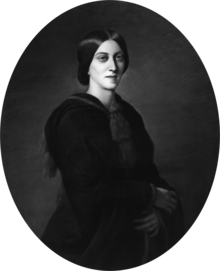Adelaide Ann Procter
| Adelaide Anne Procter | |
|---|---|

Undated portrait
|
|
| Born |
30 October 1825 London, England, United Kingdom |
| Died | 2 February 1864 (aged 38) London, United Kingdom |
| Resting place | Kensal Green Cemetery |
| Occupation | Poet, philanthropist |
Adelaide Anne Procter (30 October 1825 – 2 February 1864) was an English poet and philanthropist. She worked prominently on behalf of unemployed women and the homeless, and was actively involved with feminist groups and journals. Procter never married. She became unhealthy, possibly due to her charity work, and died of tuberculosis at the age of 38.
Procter's literary career began when she was a teenager; her poems were primarily published in Charles Dickens's periodicals Household Words and All the Year Round and later published in book form. Her charity work and her conversion to Roman Catholicism appear to have strongly influenced her poetry, which deals most commonly with such subjects as homelessness, poverty, and fallen women.
Procter was the favourite poet of Queen Victoria. Her poetry went through numerous editions in the 19th century; Coventry Patmore called her the most popular poet of the day, after Alfred, Lord Tennyson. Her poems were set to music and made into hymns, and were published in the United States and Germany as well as in England. Nonetheless, by the early 20th century her reputation had diminished, and few modern critics have given her work attention. Those who have, however, argue that Procter's work is significant, in part for what it reveals about how Victorian women expressed otherwise repressed feelings.
Adelaide Anne Procter was born at 25 Bedford Square in the Bloomsbury district of London, on 30 October 1825 to the poet Bryan Waller Procter and his wife Anne (née Skepper). The family had strong literary ties: novelist Elizabeth Gaskell enjoyed her visits to the Procter household, and Procter's father was friends with poet Leigh Hunt, essayist Charles Lamb, and novelist Charles Dickens, as well as being acquainted with poet William Wordsworth and critic William Hazlitt. Family friend Bessie Rayner Belloc wrote in 1895 that "everybody of any literary pretension whatever seemed to flow in and out of the house. The Kembles, the Macreadys, the Rossettis, the Dickens [sic], the Thackerays, never seemed to be exactly visitors, but to belong to the place." Author and actress Fanny Kemble wrote that young Procter "looks like a poet's child, and a poet ... [with] a preter-naturally [sic] thoughtful, mournful expression for such a little child".
...
Wikipedia
